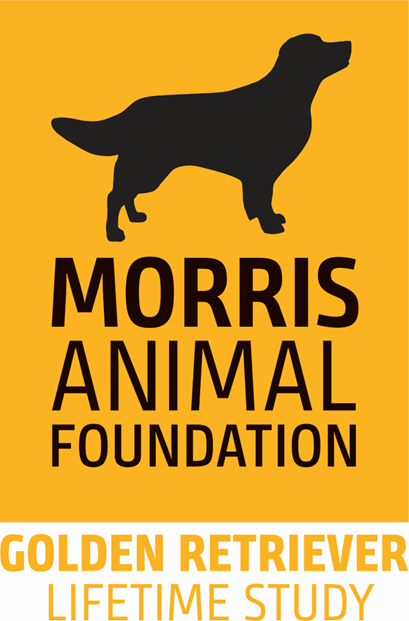Morris Animal Foundation Canine Cancer Epidemiology Research Programme (In progress)
People: David Brodbelt, Dan O'Neill, Sandra Guillen, Collette Taylor
Dates: October 2023 - October 2026
Background 
Cancer is a significant cause of morbidity and mortality in dogs. Improved understanding of canine cancer epidemiology is important from both veterinary and human health perspectives, as certain cancers exhibit similarities between dogs and humans (Dobson et al., 2013). Additionally, dogs and humans are exposed to the same potential risk factors due to similarities in environmental and lifestyle exposures (Dobson et al.,2013).
Breed associations appears to vary, with some studies reporting Golden Retrievers (among other breeds) to be at increased cancer risk (Boerkamp et al., 2014; Kent et al.,2018). In light of this, the Morris Animal Foundation established a lifetime cohort of Golden Retrievers in the US (GRLS), which is now nearing the end of its life (Guy et al., 2015). This project aims to explore the frequency of different cancers and factors associated with these cancers in dogs from the GRLS cohort. Alongside this, VetCompass health data will be examined to explore cancer frequency and risk factors in both Golden Retrievers and the wider, UK primary-practice attending population.
The project will focus initially on haemangiosarcoma, mast cell tumour and lymphoma in dogs.

Broad aims of the project:
-
Identify, and estimate the frequency of, the major cancers of the GRLS cohort and dogs in the VetCompass primary care population
-
Explore potential associations between signalment, lifestyle and environmental factors with a canine cancer diagnosis
-
Estimate the survival time from diagnosis for main canine cancers
-
Explore potential associations between signalment, lifestyle and environmental factors with survival
References:
Dobson J. M. (2013). Breed-predispositions to cancer in pedigree dogs. ISRN veterinary science, 2013, 941275. https://doi.org/10.1155/2013/941275
Boerkamp KM, Teske E, Boon LR, Grinwis GC, van den Bossche L, Rutteman GR (2014). Estimated incidence rate and distribution of tumours in 4,653 cases of archival submissions derived from the Dutch golden retriever population. BMC Vet Res. 2014;10:34. Epub 2014/02/04. pmid:24484635; PubMed Central PMCID: PMCPMC3914708.
Kent MS, Burton JH, Dank G, Bannasch DL, Rebhun RB (2018). Association of cancer-related mortality, age and gonadectomy in golden retriever dogs at a veterinary academic center (1989-2016). PLOS ONE 13(2): e0192578. https://doi.org/10.1371/journal.pone.0192578
Guy, M. K., Page, R. L., Jensen, W. A., Olson, P. N., David Haworth, J., Searfoss, E. E., & Brown, D. E. (2015). The golden retriever lifetime study: Establishing an observational cohort study with translational relevance for human health. In Philosophical Transactions of the Royal Society B: Biological Sciences (Vol. 370, Issue 1673). Royal Society of London. https://doi.org/10.1098/rstb.2014.0230
Funding Partners
This project is funded by the Morris Animal Foundation.
Dates: October 2023 - August 2024
Background
Over the last decade, Morris Animal Foundation (MAF) has established a lifetime cohort of Golden Retrievers (GRLS) in the US (Guy et al. 2015). This cohort is now nearing the end of its life and has identified haemangiosarcoma as a major tumour of this breed. Describing the clinical management and identifying signalment and lifestyle risk factors for haemangiosarcoma in this common breed could help understand the nature and progression of this important cancer. This MRes project aims to evaluate major animal and lifestyle risk factors for haemangiosarcoma in Golden Retrievers and contextualise these findings in the wider dog population within VetCompass.
Study objectives
- To estimate the frequency of haemangiosarcoma in the dogs in the UK within VetCompass
- Identify major breed associations for diagnosis of haemangiosarcoma in the UK
- Evaluate lifestyle and animal factors for haemangiosarcoma in Golden Retrievers in the Golden Retriever lifetime cohort
Method
Using the GRLS cohort of approximately 3,000 Golden Retrievers with a complete life history, the incidence of haemangiosarcoma will be estimated. Diagnosis will be based on owner reported cancer confirmed by veterinary diagnosis and evidence of further tests and animal and lifestyle risk factors explored. Risk factors exploration will be derived from data from the yearly owner and veterinarian questionnaires and will focus on animal life style (diet, activity, home environment).
In the VetCompass study, cases of haemangiosarcoma will be identified from the electronic health records of dogs under veterinary care within VetCompass during 2019. Cases of haemangiosarcoma will be defined based on a clinical diagnosis and presence of histological evidence. Incidence of haemangiosarcoma will be estimated and signalment risk factors for diagnoses evaluated.
In both studies, risk factors will be explored in multivariable logistic regression models. Statistical significance will be set at the 5% level.
References
Guy, M. K., R. L. Page, W. A. Jensen, P. N. Olson, J. D. Haworth, E. E. Searfoss and D. E. Brown (2015). "The Golden Retriever Lifetime Study: establishing an observational cohort study with translational relevance for human health." Philosophical Transactions of the Royal Society of London B: Biological Sciences 370(1673).
Project funders
This project is funded by the Morris Animal Foundation.
Dates: October 2024 - September 2025
Background

Mast cell tumour (MCT) represents the most common skin malignancy in dogs, representing 16-21% of all skin lumps. MCTs behave on a spectrum from benign, where complete excision can prove curative; versus highly malignant, resulting in mortality both via local tumour effects and distant metastasis. For this reason, gathering epidemiological data to develop associations between tumour features and behaviours/survival will be useful to clinicians. This study uses data from primary-care practices to provide estimates more applicable for general practitioners.
Study objectives
-
Calculate frequency of diagnosis with MCT
- Investigate demographic risk factors for diagnosis with MCT
- Assess survival of dogs diagnosed with MCT
Method
.png)
This project will use two datasets. VetCompass electronic patient records from UK primary-care practices in 2016 will be used. Cases will include dogs with MCT incident between 1st Jan and 31st December 2016 based on cytological or histological diagnostic test. Golden Retriever Lifetime Study (GRLS) is a cohort of 3000 US dogs enrolled between 2012-15 who are seen for annual health assessment/questionnaires, as well as health event recording, such as diagnosis with MCT. Golden Retrievers are reported to be at increased risk of high grade and aggressive MCT.
MCT incidence will be estimated. Demographic risk factors for diagnosis (age, breed, sex, neuter status, weight) will be assessed by multivariate logistic regression. VetCompass cases are manually reviewed and encoded with details of tumour size, location and mortality. Survival analysis will be performed via Cox proportional hazards model. VetCompass data will provide contemporary epidemiological review and uniquely present survival times of dogs with MCT in UK primary-care practices. GRLS data will hone in on a population potentially at risk of higher grade and more aggressive disease, as well opportunity to integrate data regarding lifestyle and environment.
Project funders
This project is funded by the Morris Animal Foundation.
Papers
Survival time and prognostic factors in dogs clinically diagnosed with haemangiosarcoma in UK first opinion practice Taylor, C., Barry, G.J., O'Neill, D.G., Guillén, A., Pickard Price, P., Labadie, J., Brodbelt, D.C. (2025) PLoS ONE
Infographics
Haemangiosarcoma survival of dogs in UK first opinion practice
Conference presentations
Barry, GJ., O'Neill, DG., Taylor, C., Guillen, A., Brodbelt, DC. (2024). The epidemiology of haemangiosarcoma in dogs under veterinary care in the UK in 2019 (Poster). SVEPM, Uppsala, Sweden. Available here.
Taylor, C., O'Neill, DG., Guillen, A., Brodbelt, DC. (2024). Exploring environmental, lifestyle and demographic factors associated with canine cancers (Poster). SVEPM, Uppsala, Sweden. Available here.
Barry, GJ., O'Neill, DG., Guillen, A., Taylor, C., Labadie, J., Pickard Price, P., Brodbelt, DC. (2025). Epidemiology of haemangiosarcoma in dogs under primary veterinary care in the United Kingdom: Frequency, diagnosis and risk factors (Oral presentation). SVEPM, Berlin, Germany.
Barry, GJ., O'Neill, DG., Guillen, A., Taylor, C., Labadie, J., Brodbelt, DC. (2025). Venting the epidemiological spleen of haemangiosarcoma in the Golden Retriever Lifetime Study (Oral presentation). BSAVA, Manchester, UK.
Stratton, Z., Brodbelt, DC., Guillen, A., O'Neill, DG., Labadie, J., Taylor, C. (2025). Epidemiology of mast cell tumour in dogs (Poster). SVEPM, Berlin, Germany. Available here.
Taylor, C. Barry, GJ., O'Neill, DG., Guillen, A., Pickard, P., Labadie, J., Brodbelt, DC. (2025). Haemangiosarcoma survival of dogs in UK first opinion practice (Poster). SVEPM, Berlin, Germany. Available here.
Vet Compass Project Type: Dog


